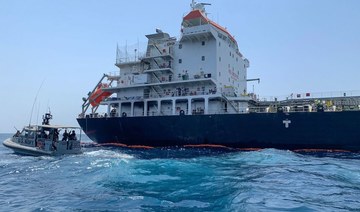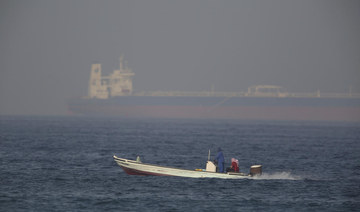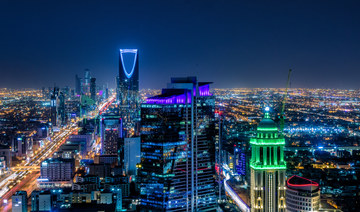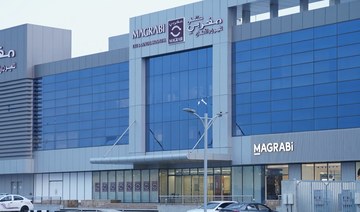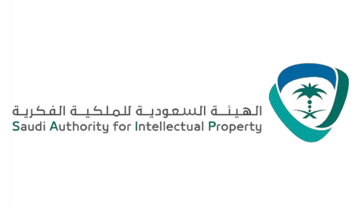DUBAI: Attacks on tankers in the Arabian Gulf have jolted the shipping industry, with some of the 2,000 companies operating ships in the region on high alert and ordering their vessels to transit the Strait of Hormuz only during daylight hours and at high speed.
Washington’s accusation that Iran is behind the attacks targeting oil tankers comes as tensions flare between the two countries. The US has deployed an airstrike carrier and bombers to the region, and announced this week it will send 1,000 more troops. European powers are facing a deadline from Tehran to ease the effects of punishing US sanctions — described by its leaders as “economic warfare” — or Iran will break out of the limits set on its uranium enrichment by the landmark 2015 nuclear deal.
The apparent targeting of tankers is alarming to ship owner, said chief shipping analyst at BIMCO, Peter Sand. The company dubs itself the world’s largest shipping association.
But it’s more or less business as usual for shippers, he said, despite the need for added precautions.
“They are all of course increasingly worried, but many of them are going with business as they would have done without the attacks, but of course with an extra layer of safety and security measures on top of that,” Sand said.
That means going at high speed through the Strait of Hormuz, which at its narrowest point is about 3 kilometers (2 miles) wide. Normally, vessels carrying cargo would slow down to save on fuel costs.
It also means avoiding the strait at night to keep better watch on security around the vessel.
Washington alleges Iranian forces surreptitiously planted limpet mines on two vessels in the Gulf of Oman last week. The attack forced the evacuation of all 44 crewmembers onboard and left one of the ships ablaze at sea.
Washington also blamed Iran for similar attacks on May 12 that targeted four oil tankers anchored off the coast of the UAE. Iran denies being involved. The attacks last week targeted the Norwegian-owned MT Front Altair, which had a cargo of highly flammable naphtha loaded from the UAE, and the Kokuka Courageous, a Japanese tanker carrying Saudi methanol. Both had been traveling through the Gulf of Oman, having passed the Strait of Hormuz.
Of the roughly 2,000 companies that operate ships in the Gulf, only two companies have halted bookings outright. Otherwise, “business has continued more or less undisrupted,” Sand said.
In fact, higher risks could boost the bottom line for some oil shippers, after a lackluster period for the industry. A risk analysis by shipping services company Braemar ACM said owners can ask for higher premiums now. The firm said the Gulf region was declared as a “Listed Area,” meaning it faces enhanced risk, after the May 12 incidents targeting tankers off the UAE coast.
Immediately after last week’s attacks, freight rates for operators in the Gulf rose 10-20 percent.
With increased risks, however, come higher insurance premiums, which are expected to rise 10-15 percent.
It’s typically the buyers and charterers who bear the brunt of the overall higher costs, another reason why security of the Strait of Hormuz is paramount for oil-importers around the world. An estimated 18-20 million barrels of oil — much of it crude — pass through the strait every day. BIMCO says anywhere between 10-40 vessels carrying just crude oil move through daily.
During the so-called Tanker War of the 1980s, when Iran and Iraq targeted vessels carrying one another’s exports, the US Navy escorted oil tankers through the Arabian Gulf to ensure American energy supplies. But the US is no longer as reliant on Arabian producers.
Today, any conflict that threatens tankers would badly disrupt crude supplies for energy-hungry East Asia. Higher prices could hit hardest China, Japan, South Korea, Singapore and Indonesia — among the five biggest buyers of Arabian oil.
Indeed, the MT Front Altair was headed to Japan; the Kokuka Courgaeous reportedly to Singapore.
The Washington Post quoted this week Air Force Gen. Paul J. Selva, vice chairman of the Joint Chiefs of Staff, as saying that because most of the oil passing through the Strait of Hormuz is headed to Asian markets, it would be ill-advised for the US military to take the same role it did in the 1980s.
He said there were plans to reach out to the big Asian oil-importers about a possible international effort to safeguard tanker traffic.
Robert Macleod, CEO of Frontline Management, whose vessel Front Altair was targeted last week, said the general area of the Strait of Hormuz “represents a real and very serious risk to shipping.”
In a statement, he said crews must be on high alert while traversing through the passage. The company, however, said it had re-commenced trading in the region after briefly halting it following the attack. He said the company also tightened security measures, but did not elaborate.
One extraordinary measure ship owners might consider, if the situation deteriorates further, is having armed guards onboard. This is already the case for many vessels transiting the Gulf of Aden, where piracy is a major concern.
“From a shipping industry perspective, we are certainly not in favor of bringing more armed guards onboard international commercial ships because they are
not warships,” said Sand. “They should not be carrying arms. They should be able to transit without being interrupted.”
Crude shippers boost security after attacks on tankers in Gulf
Crude shippers boost security after attacks on tankers in Gulf
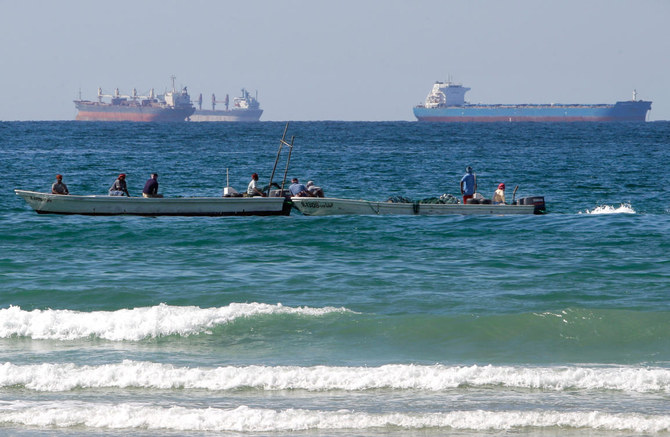
- Some of the 2,000 companies operating ships in the region are on high alert - ordering their vessels to transit the Strait of Hormuz only during daylight hours and at high speed
- Washington’s accusation that Iran is behind the attacks targeting oil tankers comes as tensions flare between the two countries
ACWA Power, IRENA join hands to accelerate global renewable energy transition
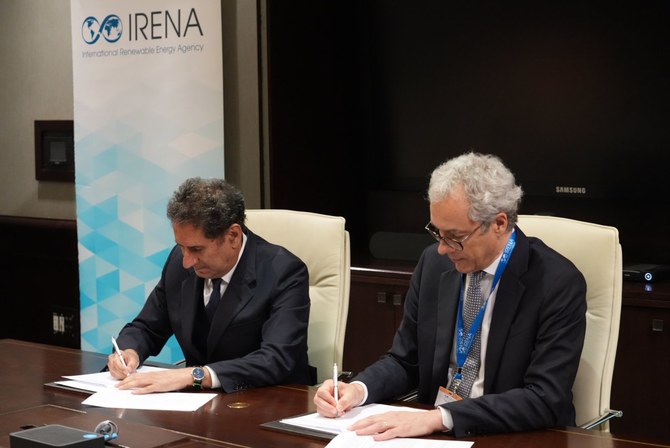
RIYADH: In a bid to add impetus to the adoption of clean energy sources worldwide, Saudi utility firm ACWA Power has signed a deal with the International Renewable Energy Agency, said a press release issued on Thursday.
The Saudi-listed firm said that the partnership aligns with its mission to provide sustainable energy solutions and seeks to accelerate the adoption and sustainable use of renewable energy across the globe.
ACWA Power will work closely with IRENA to share crucial insights on infrastructure investment in renewable energy, green hydrogen advancement, solar energy, smart grids, and the intersection of energy and water, the press release said.
The Saudi-listed company also announced its participation in various IRENA initiatives, such as Green Hydrogen, Collaborative Frameworks, Project Facilitation, the Alliance for Industry Decarbonization, the Utilities for Net-Zero Alliance, and the Coalition for Action.
As per the deal, ACWA Power and IRENA will investigate avenues to mobilize finance and investment for renewable energy projects, while also supporting infrastructure for the development, storage, distribution, transmission, and consumption of renewables.
Moreover, collaborative workshops and seminars will be arranged to exchange best practices, enhance skills, and promote awareness of the energy transition among youth, professionals, and the public using IRENA’s platforms and programs.
ACWA Power CEO Marco Arcelli said the partnership with IRENA marks a significant milestone in his company’s journey toward a sustainable energy future.
“By combining our strengths and resources, we are prepared to drive meaningful change and accelerate the transition to renewable energy on a global scale,” he said.
The CEO added that through collaborative partnerships and innovative solutions, ACWA Power remains committed to advancing the widespread adoption and sustainable use of renewable energy, shaping a brighter and more sustainable future for generations to come.
IRENA Director General Francesco La Camera commented: “We have less than a decade left to secure a fighting chance for a 1.5°C world. Accelerating the renewable-based energy transition needs industry leaders and this deal between IRENA and ACWA Power stands for the growing commitment of global industry to act on decarbonization.”
He added: “We need to act together to accelerate the sustainable use of renewables and green hydrogen across the globe.”
Closing Bell: TASI ends the week in green with trading turnover at $2.18bn
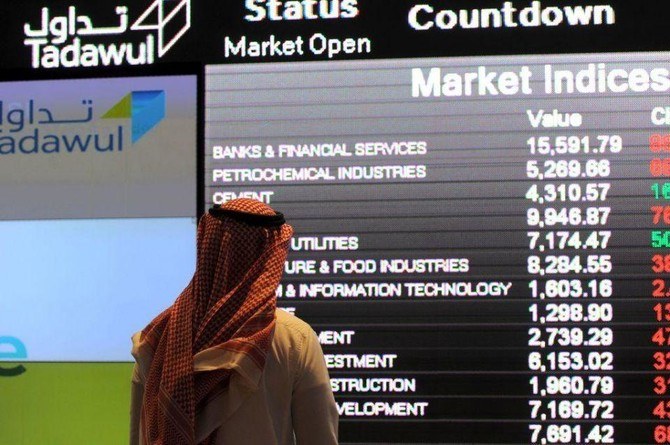
RIYADH: Saudi Arabia’s Tadawul All Share Index rose on Thursday, gaining 36.37 points, or 0.29 percent, to close at 12,502.35.
The total trading turnover of the benchmark index was SR8.19 billion ($2.18 billion) as 130 stocks advanced, while 90 retreated.
The MSCI Tadawul Index also increased by 5.98 points, or 0.38 percent, to close at 1,575.11.
The Kingdom’s parallel market, Nomu, followed suit and gained 305.77 points, or 1.16 percent, to close at 26,418.75. This comes as 33 stocks advanced, while as many as 27 retreated.
The best-performing stock on the main index was Saudi Arabian Amiantit Co., as its share price rose by 7.69 percent to SR30.80.
Allianz Saudi Fransi Cooperative Insurance Co. also performed well as its share price saw a 6.79 percent increase to close at SR20.16.
This comes as Abu Dhabi National Insurance Co. completed a strategic acquisition of a 51 percent stake in Allianz, according to the Emirates News Agency, WAM.
ADNIC Chairman Mohamed Al- Nahyan told WAM: “The connection between the UAE and Saudi Arabia is deep, mutually beneficial and ever-growing. At ADNIC, we see Saudi Arabia as a high-potential market which perfectly aligns with our overall growth strategy, and we are looking forward to unlocking new possibilities for growth and success.”
Other top performers include United Cooperative Assurance Co. and Saudi Pharmaceutical Industries and Medical Appliances Corp. whose share prices soared by 5.68 percent and 5.51 percent, to stand at SR11.16 and SR14.16 respectively.
The worst performer was Alkhaleej Training and Education Co., whose share price dropped by 5.27 percent to SR33.25.
On the announcements front, Saudi mining giant and Public Investment Fund subsidiary, Saudi Arabian Mining Co., known as Ma’aden, announced the launch of single stock options in a statement on Tadawul.
SSOs will enable local and international investors to effectively hedge and manage portfolio risks as well as diversify products available for trading in the market.
Saudi minister calls for ‘decisive financial policies’ to counter global economic uncertainties
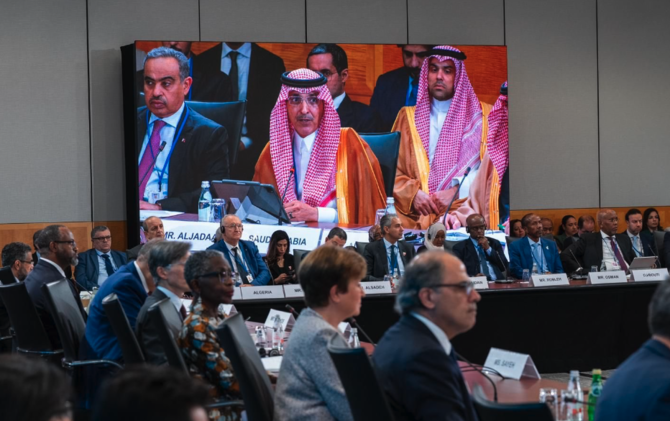
RIYADH: Saudi Arabia’s finance minister on Thursday stressed the need for “decisive financial policies” across the world to navigate through uncertain economic conditions.
Speaking during the Spring Meetings 2024 of the IMF held in Washington, D.C, Mohammed Al-Jadaan noted that such a decisive approach would bolster resilience and sustainability amid the ongoing uncertainties.
He was attending a meeting of finance ministers and governors of the Middle East, North Africa, Afghanistan and Pakistan region with IMF Managing Director Kristalina Georgieva.
“I also participated in the Global Sovereign Debt Roundtable, where I highlighted the importance of enhancing Comparability of Treatment by establishing a clear and fair framework that ensures equitable treatment among all creditors,” Al-Jadaan said in a post on X.
Additionally, the minister participated in the second G20 finance ministers and central bank governors’ meeting held under the Brazilian presidency in Sao Paulo. He emphasized that effective climate action required a holistic approach.
He said that can be achieved “by integrating diverse sectors acknowledging the diversity of solutions to address climate challenges, including using innovative technologies to manage emissions.”
Al-Jadaan also met with Jose Vinals, chairman of Standard Chartered Bank, to discuss the regional and global economic outlook.
He also met with Spanish Minister of Economy, Trade, and Business, Carlos Cuerpo to discuss ways to enhance relations between the two countries.
Moreover, Al-Jadaan held talks with Jean Lemierre, chairman of Bank BNP Paribas, the global head of Official Institutions Coverage, Laurent Leveque, and the head of Debt Capital Markets, Alexis Taffin.
They discussed progress made in Saudi Arabia, as well as issues related to attracting investment and alternative financing.
Magrabi opens new complex in Makkah
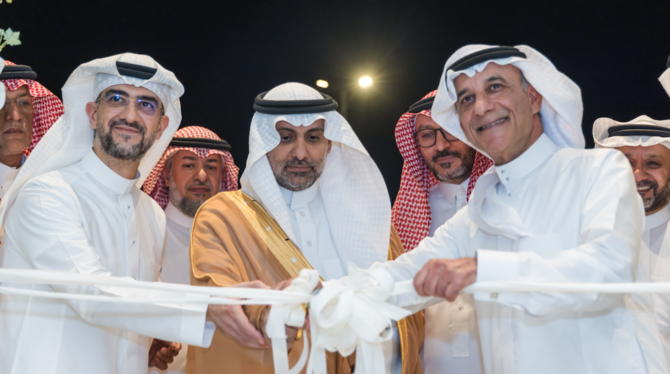
RIYADH: With a new branch in Makkah, Magrabi Hospitals and Centers are expanding to more Saudi cities to meet the growing demand for specialized ophthalmological and dentistry care.
Minister of Health Fahad Al-Jalajel inaugurated the medical complex and one-day surgery center in the holy city, accompanied by Magrabi Hospitals and Centers CEO Mutasim Alireza, the Group’s Deputy CEO and Cheif Operating Officer Abdulrahman Barzangi, and several officials and dignitaries.
Al-Jalajel underscored that the opening reflects the Kingdom’s commitment to enhancing the quality of its healthcare services and transitioning toward a more comprehensive and integrated medical system.
He further stated that this initiative is a vital component of the Health Transformation Program, a foundational aspect of Saudi Vision 2030, which has achieved significant milestones and advancements in the medical sector under the leadership of Crown Prince Mohammed bin Salman.
Following the official inauguration, the minister toured the complex’s facilities, noting its significance as a notable project and a valuable contribution to the Kingdom.
Alireza said: “This specialized medical complex underscores our commitment to being at the forefront of healthcare for ophthalmology and dental services and continuing our mission to offer specialized medical services that meet community needs with the utmost quality and safety.”
In March, Magrabi Ophthalmology and Dentistry Hospital Dammam officially opened its doors in Al-Shaala, marking an achievement for medical care in Saudi Arabia.
The Magrabi Dammam health facility is the largest specialized center in the region and provides sub-specialized services, meeting the highest quality standards and leveraging the latest global technologies.
UAE records 64% surge in trademark registrations
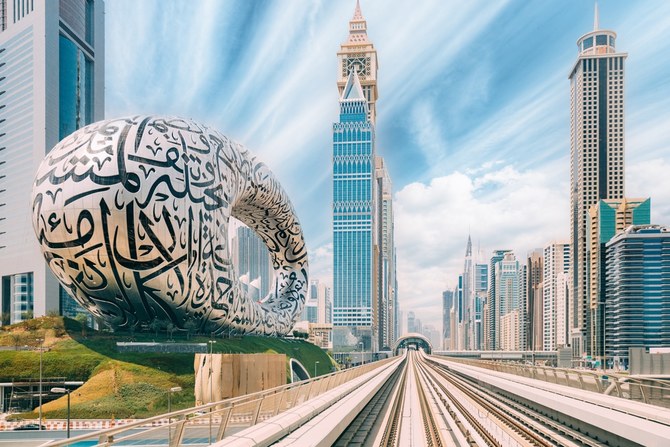
RIYADH: The UAE recorded an annual 64 percent surge in trademark registrations, amounting to 4,610 in the first quarter of 2024, official data showed.
The figures, released by the nation’s Ministry of Economy, reveal the notable increase from 2,813 signups in the same period of 2023.
March emerged as a particularly prolific period, with 2,018 new brands reported.
The trademarks registered during this time span a wide range of key sectors, including smart technology, transportation, food and beverage and pharmaceuticals as well as medical devices, finance, real estate, and more.
The preceding months of January and February collectively accounted for 2,592 trademarks, further highlighting sustained growth and momentum in registrations.
As the country continues to position itself as a global business hub, trademark registrations serve as a crucial indicator of economic vitality and innovation-driven growth.
In a release on X, the ministry noted on April 17 that it has: “Worked on developing the trademark registration service, using the latest technologies and innovative solutions to achieve higher efficiency and better interaction with clients.”
The UAE’s adherence to international treaties and agreements further strengthens its trademark registration regime.
By adhering to agreements like the Paris Convention for the Protection of Industrial Property and the Agreement on Trade-Related Aspects of Intellectual Property Rights or TRIPS, the UAE facilitates international trademark registration and enforcement, empowering businesses to broaden their operations across borders.
The nation has further established mechanisms for enforcing trademark rights and combating infringement.
These include civil remedies, such as damages, injunctions, and seizure of infringing goods, as well as criminal penalties for trademark counterfeiting and piracy.



